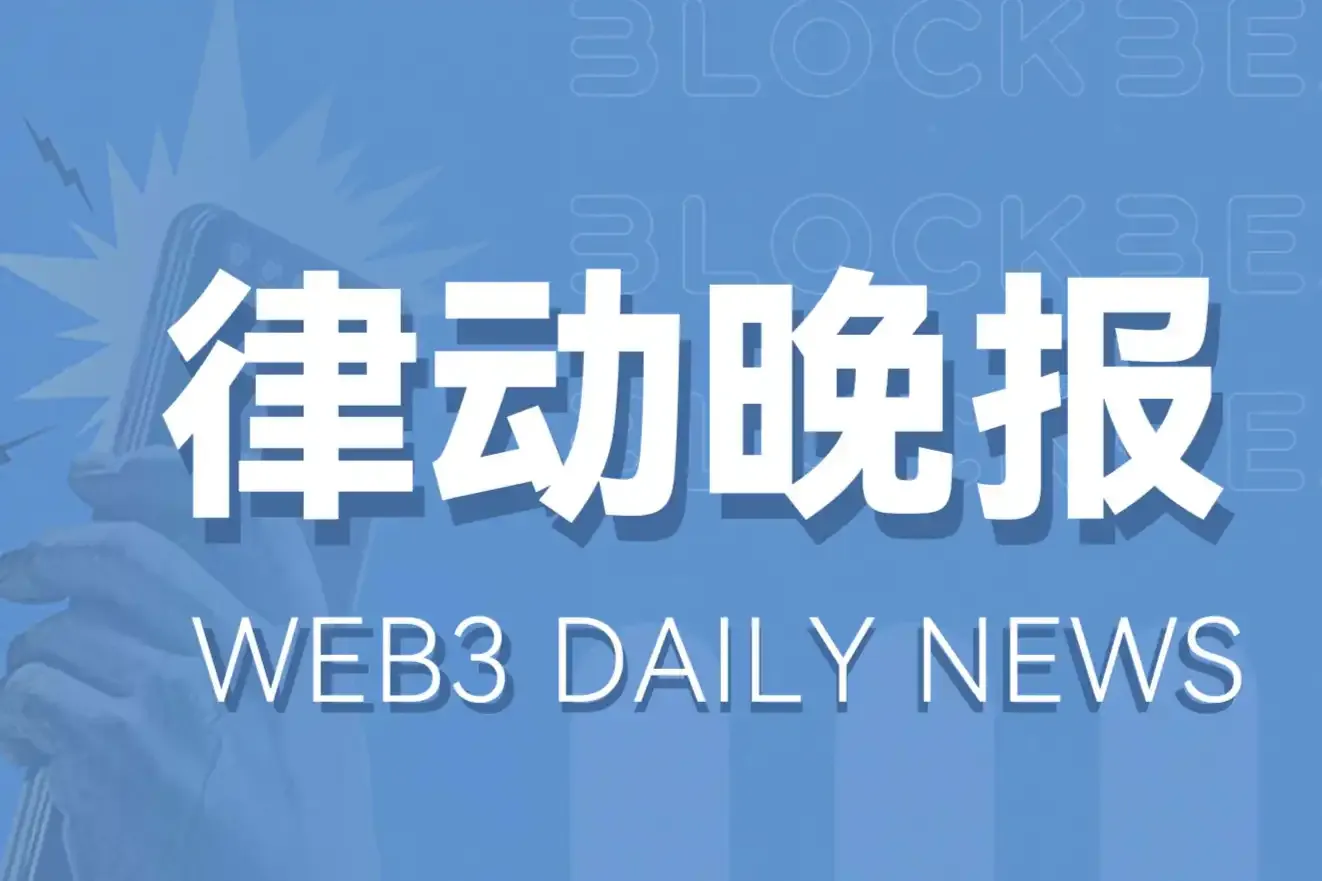On October 21, 2025, an Ethereum wallet marked "coinbase.eth" transferred 25 million USDC to cryptocurrency KOL Cobie for the purchase of an NFT called UpOnly.
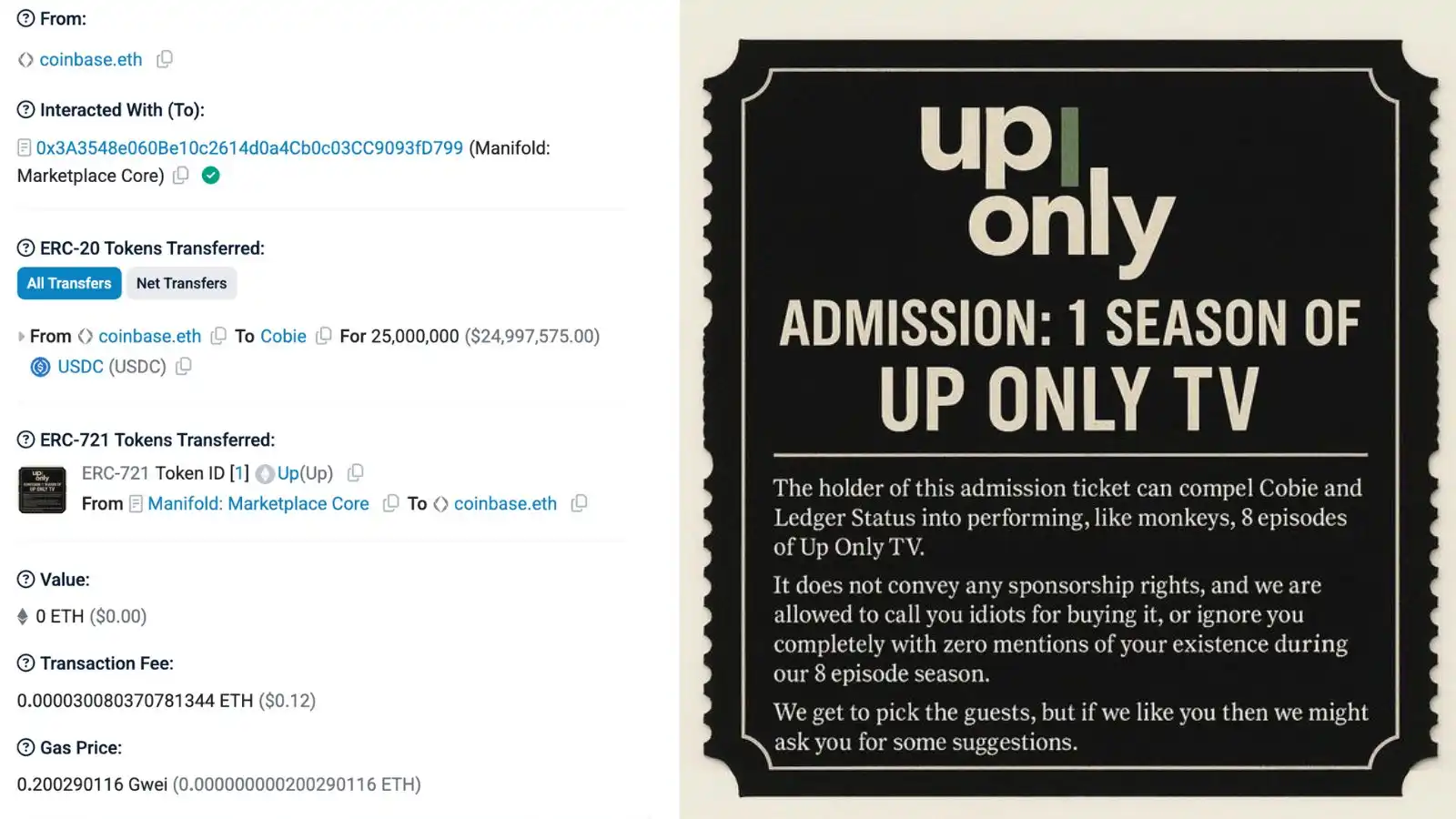
UpOnly was once the hottest podcast in the crypto circle, hosted by Cobie and his partner Ledger, featuring heavyweight guests like Vitalik Buterin and SBF. The show went off the air after the FTX collapse in 2022, and this NFT was issued by Cobie that year, allowing the holder to choose to destroy it, thereby compelling the two hosts to record a new season of the show.
An hour later, Cobie tweeted on X: "UpOnly has been over for three years. I was in my twenties when we started the show, and now I have gray hair. We should rename it 'Unc Only,' and then I will spend 25 million dollars on plastic surgery. See you later."

This reaction is very Cobie—self-deprecating, humorous, with a hint of helplessness.
In the spring of 2022, he exposed insider trading by Coinbase employees through on-chain data analysis. Cobie publicly shared his analysis on social media, pointing to potential information leaks within Coinbase. Months later, the U.S. Department of Justice charged former Coinbase product manager Ishan Wahi with insider trading. In 2023, Wahi was convicted and sentenced to two years in prison.
At that time, Cobie often enjoyed exposing the pretentiousness of large companies, standing in opposition to Coinbase. Now, Coinbase has bought his NFT. To be precise, what they purchased was the right to compel him and his partner Ledger Status to produce eight episodes of UpOnlyTV.
At the same time, Coinbase CEO Brian Armstrong confirmed on social media: "The rumors are true; we bought this NFT. The UpOnly show is coming back."
The crypto community erupted in discussion. Some cheered, "The bull market is really back," while others questioned, "Is Coinbase trying to control public opinion?" and some asked, "What makes an NFT of a podcast worth 25 million dollars?"
To understand this transaction, we need to go back three years. At that time, the NFT market was booming, UpOnly was the hottest podcast in the crypto space, and Cobie had just made a seemingly joking decision: to write the control of the show into an NFT smart contract.
Three Years of an NFT
From 2021 to 2022, it was the golden age of UpOnly and the most fervent era for NFTs.
Every Thursday at 8 PM, Cobie and Ledger would livestream on Twitch, interviewing the most influential figures in the crypto space. Ethereum founder Vitalik Buterin discussed Layer 2 scaling solutions, FTX founder SBF talked about regulatory strategies, and Terra founder Do Kwon shared insights on the future of algorithmic stablecoins.
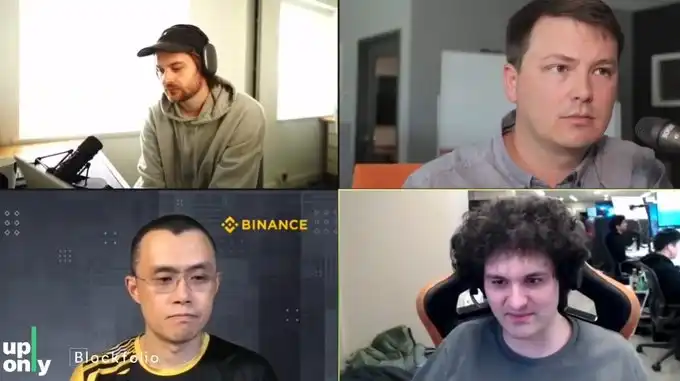
CZ and SBF as guests on UpOnly
The show's hallmark was its unorthodox style, with hosts daring to ask sharp questions and guests not sticking to formalities. The self-introduction of the show read: "A crypto podcast once described as immature, unprofessional, and weird. Prioritizing entertainment over Alpha, but most of the time, neither."
In November 2022, UpOnly witnessed one of the most dramatic moments in crypto history: the collapse of FTX.
On November 2, a report by CoinDesk revealed issues with Alameda Research's balance sheet. This trading firm, founded by SBF, had about 5.8 billion of its 14.6 billion in assets tied up in FTX's own issued token, FTT. This exposed the deep connections between the two "independent" companies, with the deeper issue being FTX's misappropriation of customer funds to cover Alameda's losses. Panic began to spread in the market. On November 6, Binance CEO Changpeng Zhao announced he would sell his FTT holdings, triggering a bank run. Customers rushed to withdraw funds, and FTX's liquidity evaporated within days.
On November 10, UpOnly held an emergency livestream, interviewing former FTX employee Zane Tackett.
Zane had just left the company and was trying to help FTX's executives find solutions. The livestream lasted three hours, with Cobie and the guest almost speechless, just staring at the news and social media, watching a once multi-billion dollar empire collapse in real-time. The next day, on November 11, FTX filed for bankruptcy, and SBF resigned.
Shortly after that livestream, UpOnly went off the air. Cobie mentioned he had a significant amount of funds in FTX, resulting in considerable losses. But the deeper reason was that FTX's collapse had torn open the wounds of the entire crypto content ecosystem.
FTX was not just an exchange; it was the industry's financial backer. It had sponsored nearly all mainstream crypto media, funded podcasts, named conferences, and paid KOLs for advertisements. It spent $135 million to acquire naming rights for the Miami Heat arena, hired Tom Brady and Gisele Bündchen as endorsers, and poured tens of millions into advertising. The purpose of this money was clear: to control the narrative and shape the image, making everyone believe FTX was a "safe and reliable industry leader."
After FTX's collapse, these funding streams dried up, and many crypto media outlets faced existential crises. The CEO of The Block resigned over a scandal involving undisclosed loans from FTX, CoinDesk was forced to lay off staff, and many small independent media outlets shut down. Those KOLs who had taken money from FTX fell silent or busied themselves distancing from the company.
Trust was bankrupt.
UpOnly also lost the motivation to continue. Cobie pivoted to entrepreneurship, launching an angel investment platform called Echo in 2022, followed by a token sale platform called Sonar in 2025. He thought he could step out of the spotlight and become a behind-the-scenes investor.
But during UpOnly's peak, Cobie made a decision: to issue an NFT that wrote the control of the show into a smart contract.
This NFT was named "Up Only Television Season Pass." It was not a profile picture or a piece of art; according to the description on the Manifold platform: "If the holder destroys this NFT, a new season of UpOnlyTV will launch within three months."
Interestingly, this "contract" had some unusual terms. According to previous reports, it explicitly stated that the purchase did not include any sponsorship rights, allowing the hosts to ignore or mock the buyer during the show.
This design was counterintuitive. In traditional content sponsorship, buyers spend money to gain exposure, placement, and control over the narrative. But Cobie's NFT clearly stated that you could pay me to make a show, but you couldn't dictate what I say; I could even insult you on the show.
From 2022 to 2024, the NFT market collapsed. Those profile picture NFTs that once sold for hundreds of thousands of dollars mostly went to zero. OpenSea's trading volume plummeted from a peak of tens of billions per month to less than 100 million. The floor price of Bored Apes dropped from a high of 150 ETH to under 30 ETH. Criticism of the "JPG scam" surged, and NFTs became synonymous with speculation and bubbles.
But the UpOnly NFT did not go to zero. Because it represented not an image, but a real right: to compel two influential people to do something valuable.
This was precisely the original promise of NFT technology: to record rights on the blockchain and execute rules through smart contracts. It was just that in the frenzy of 2021, this promise was drowned out by the hype around profile pictures.
In October 2025, Bitcoin regained its high position, and various ecosystems became active again. At this time, Coinbase offered 25 million dollars to buy this NFT.
From Opposition to Collaboration
Cobie, whose real name is Jordan Fish, was born in the 1990s in the UK and graduated with a degree in computer science from the University of Bristol. He encountered Bitcoin in the early 2010s and gradually became an active trader in the crypto space. His online name Cobie comes from an early gaming community, and this name later became one of the most influential labels in the crypto world.
Cobie's career has been quite diverse. He has worked as a product manager, handled growth operations, and invested in countless projects. He was an early supporter of Lido Finance, a liquid staking protocol that later became one of the largest projects by TVL in the DeFi space. He founded Echo, an angel investment platform for early-stage projects, and later launched Sonar, a token public sale platform, attempting to redefine the ICO model.
But what truly made Cobie famous was his outspoken nature.
He is known for his frankness on social media, daring to criticize major projects, expose issues, and say what others are afraid to say. In the spring of 2022, he discovered unusual trading patterns before Coinbase listed new tokens and publicly questioned internal leaks. This revelation ultimately led to the prosecution of former Coinbase product manager Ishan Wahi, who was sentenced to two years in prison in 2023.
At that time, Cobie represented the "independent voice" in the crypto space. He did not belong to any exchange, did not take money from any project parties, made money through trading and investing, and spoke through his influence. UpOnly was the same, not accepting sponsorships, not doing soft articles, and freely criticizing whoever they wanted.
But the collapse of FTX changed everything.
Cobie suffered financial losses with FTX, the specific amount he did not disclose, but he said it was "significant." More importantly, the collapse of FTX revealed the ugliest side of the crypto space, where media and KOLs who were paid to speak collectively fell silent when the crisis hit. Credibility was bankrupt, trust collapsed, and the entire content ecosystem needed to be rebuilt.
Cobie chose to temporarily step back. He focused his energy on Echo and Sonar, trying to change the industry from the perspectives of investment and infrastructure. UpOnly went off the air, and that NFT quietly lay in his wallet until Coinbase came knocking.
Why Coinbase? Why now?
Coinbase needs a voice. Not the kind of official, serious, educational voice that it already has—there are hundreds of tutorials on Coinbase Learn covering everything from the basics of Bitcoin to advanced DeFi topics.
What it needs is the kind of voice that UpOnly has, one that young people love to watch, KOLs love to share, can create topics, and lead narratives.
More importantly, it needs "authenticity."
The lessons from FTX are too profound. Those voices that were bought off ultimately became a joke. What truly holds influence are those who dare to speak the truth. Cobie exposed insider trading at Coinbase, and because of that, his words carry weight. If he says Coinbase is doing well on UpOnly, people will believe it; if he says there are problems at Coinbase, people will also believe it.
This kind of trust cannot be bought with 25 million dollars. But Coinbase can buy a communication channel to make that trust work for itself.
So Coinbase bought this NFT. But Cobie can criticize Coinbase on the show, question its policies, and expose its problems. By spending 25 million dollars, Coinbase is buying a platform that can criticize itself.
This sounds absurd, but it might be exactly what Coinbase wants. Because only truly independent voices have credibility. Only those who dare to criticize you can help you build trust.
Cobie has transformed from an exposer of dark secrets to a "partner" of Coinbase, while still retaining the freedom to criticize. But the question is, how long can this freedom last? When Coinbase becomes your financial backer, can you still be as sharp as before?
The New Battlefield for Discourse
In the traditional financial world, there are clear boundaries between exchanges and media. The New York Stock Exchange does not run The Wall Street Journal, and Goldman Sachs does not buy Bloomberg. The existence of this boundary is to maintain market fairness and the independence of information.
But in the crypto space, this boundary has never existed.
During the FTX era, the logic was sponsorship. FTX paid nearly all mainstream crypto media for exposure and favorable coverage. It spent 135 million dollars to acquire naming rights for the Miami Heat arena, hired Tom Brady as a spokesperson, advertised during the Super Bowl, sponsored esports teams, and named crypto conferences. SBF himself became a media darling, frequently interviewed and portrayed as the "savior of the crypto world" and a "practitioner of effective altruism."
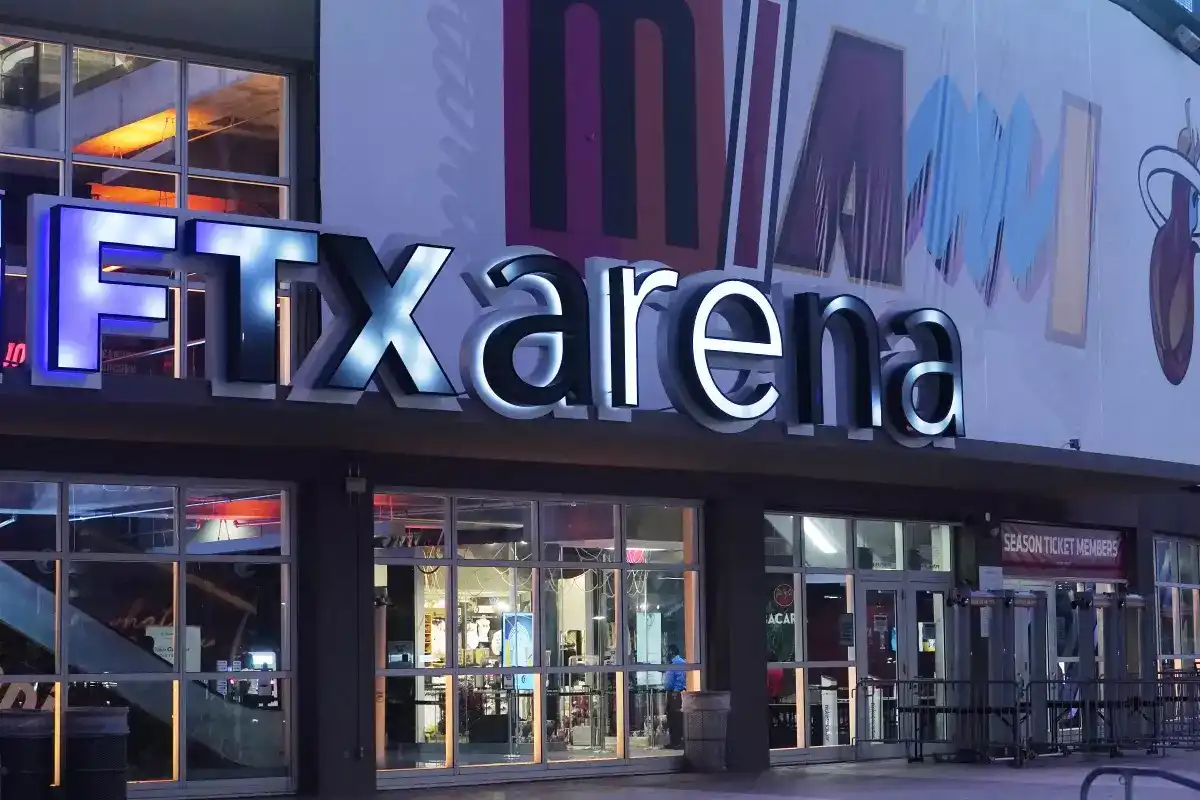
The Miami Heat arena named after FTX | Source: Los Angeles Times
The outcome is well-known. In March 2024, SBF was sentenced to 25 years in prison for misappropriating customer funds, wire fraud, money laundering, and other serious crimes. The court found that he transferred about 10 billion dollars of customer funds to Alameda Research for high-risk investments, political donations, and personal expenses. Those media and KOLs who took money from FTX fell silent during the collapse or busied themselves distancing from the company.
Coinbase's strategy is different. It does not control media through sponsorship but directly owns content IP. However, its method of ownership is also different—not through company acquisitions or hiring employees, but by purchasing an NFT to gain a transparent, smart contract-based right.
This choice is very Coinbase.
In August 2023, Coinbase launched Base, a Layer 2 blockchain based on Ethereum. The mission of Base is clearly stated: "To build a global on-chain economy that increases innovation, creativity, and freedom." Jesse Pollak, the head of Base, repeatedly emphasizes a concept: "Make on-chain the next online," aiming to bring 1 billion people on-chain.
Now, Coinbase has completed a 25 million dollar content collaboration using an NFT smart contract. This itself is a practice of the "everything on-chain" philosophy. Not using traditional paper contracts, not through lawyers and intermediaries, but recording rights on the blockchain and executing rules through smart contracts.
From this perspective, Coinbase's purchase of the UpOnly NFT is not just a marketing move; it is also a demonstration that we believe in on-chain and conduct business in an on-chain manner.
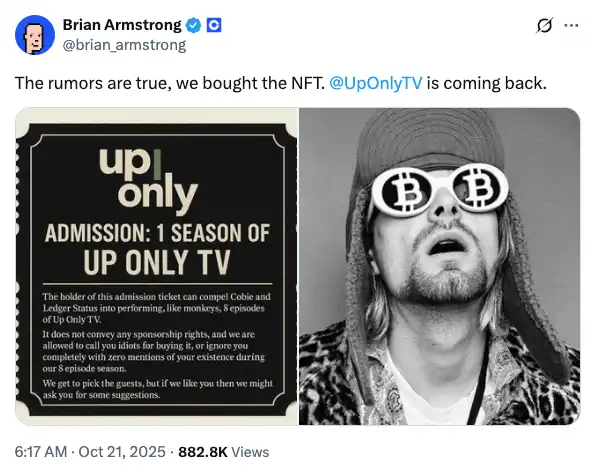
The rights Coinbase obtained are very specific: eight episodes. It is not permanent control, nor a full acquisition; it is just these eight episodes, only these eight episodes.
Imagine the new season of UpOnly launching, with Cobie and Ledger interviewing various people, asking sharp questions, and criticizing industry chaos. But everyone knows that this show is funded by Coinbase. This itself is a narrative: Coinbase supports independent voices, Coinbase is not afraid of criticism, and Coinbase is different from those exchanges that want to control public opinion.
This is a more advanced discourse strategy—not simply having the media speak for you, but allowing the existence of the media to endorse you.
However, this strategy carries risks. What if Cobie really harshly criticizes Coinbase on the show? What if he exposes new problems? Can Coinbase accept that?
The moment Coinbase bought the NFT, it accepted this risk. This is a gamble. Coinbase is betting that in the next bull market, authenticity and credibility are worth more than control.
The question is whether this redefinition is creating a healthier ecosystem or manufacturing a new monopoly. When the largest exchange owns the most influential content platform, even if the contract guarantees independence, the asymmetry of power still exists.
Will this model succeed? We do not know yet. When will the new season of UpOnly air? What will Cobie say on the show? How will Coinbase respond to potential criticism? The answers to these questions have yet to be revealed.
Cobie said he wants to rename the show "Uncle's Special" and spend 25 million on plastic surgery. This is his usual style, using self-deprecation to diffuse awkwardness. But behind the joke is a person who once exposed the dark secrets of giants and that giant being exposed, redefining the possibilities of collaboration with a 25 million dollar NFT.
Three years ago, Cobie wrote the control of UpOnly into an NFT. Three years later, this NFT sold for 25 million dollars.
Coinbase is betting that in the next bull market, authenticity and credibility are worth more than control; Cobie is betting that independence and capital can coexist.
The story is just beginning.
免责声明:本文章仅代表作者个人观点,不代表本平台的立场和观点。本文章仅供信息分享,不构成对任何人的任何投资建议。用户与作者之间的任何争议,与本平台无关。如网页中刊载的文章或图片涉及侵权,请提供相关的权利证明和身份证明发送邮件到support@aicoin.com,本平台相关工作人员将会进行核查。



